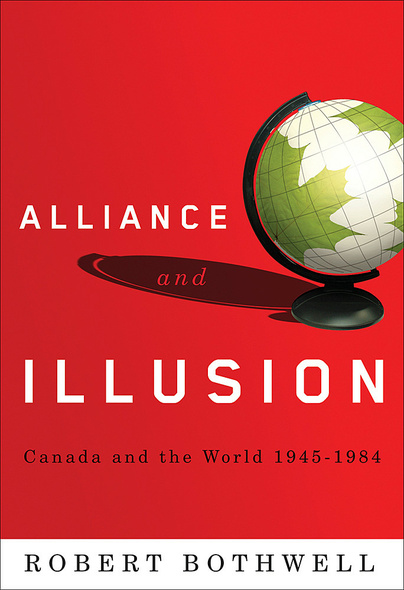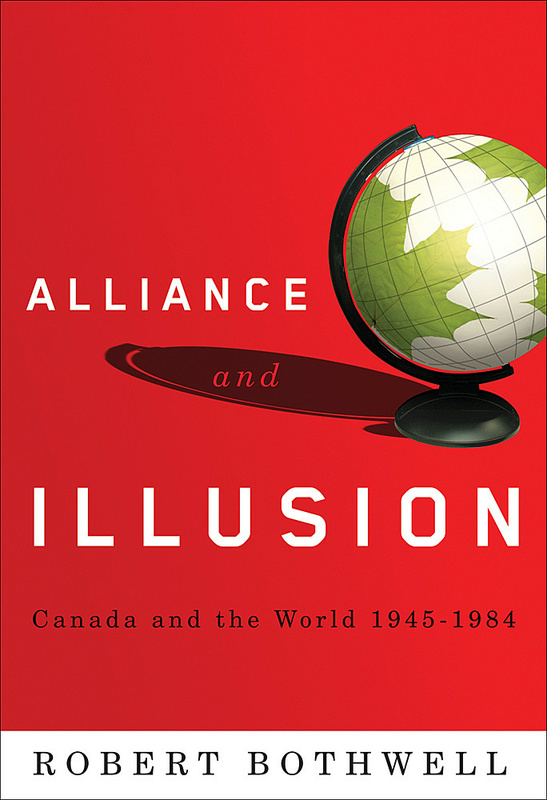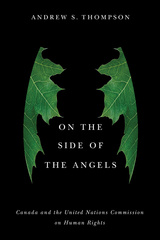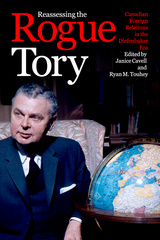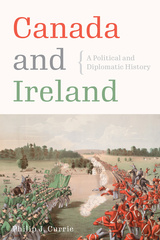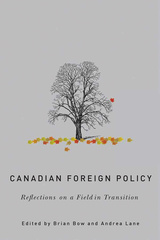Alliance and Illusion is a political, economic, and social history that examines both domestic and international aspects of Canadian foreign policy. Robert Bothwell provides nuanced studies of Canada’s leaders, examining John Diefenbaker’s muddles, Lester B. Pearson’s realism, and Pierre Trudeau’s limited policy vision. He also discusses international currents that drove Canadian external affairs, from American influence over Vietnam and the draft dodgers, to the French case of de Gaulle’s eruption into Quebec in 1967. This definitive recounting and assessment of Canadian foreign policy in the modern era fills a crucial gap in Canadian history and provides invaluable context for understanding Canada’s present-day foreign policy dilemmas.
Alliance and Illusion is essential reading for Canadian foreign policy makers, analysts, scholars, and students. Accessible and engaging, it will no less engage Canadian history and foreign affairs enthusiasts.
Awards
- 2008, Commended - Sir John A. Macdonald Prize, Canadian Historical Association
Bothwell is the scholarly dean of both Canadian diplomatic history and Canadian-American relations. He has also written extensively on all aspects of Canada’s history, domestic and foreign, including, most recently, a magisterial survey of the whole sweep of Canadian history. He has, moreover, written several excellent biographies of Canadian political figures, and brings to Alliance and Illusion a biographer’s keen instinct for fascinating detail and interesting personalities. His portraits of Prime Ministers John Diefenbaker, Lester Pearson, and Pierre Trudeau are especially riveting. With his diverse skills as a historian, Bothwell is able to explore the history of Canadian foreign relations with an unrivalled depth and breadth of knowledge and perspective.As a middle power that was occasionally successful, occasionally not, Canada is an illustrative case study of how the international system functioned in the Cold War, when soft power questions of peacekeeping, political legitimacy, and universal human rights became central concerns even to the foreign policies of the great powers. […] By freeing up vast amounts of usable land and navigable water from the frozen tundra and ice floes, and by attracting an ever-increasing population in the process, climate change will enhance Canada’s power immeasurably. Thus in future decades, if not centuries, the world will have no choice but to pay attention to Canadian concerns, traditions, ideals, and objectives. For those interested in such concerns, Alliance and Illusion would be their best place to start.
[…] Bothwell provides a masterful narrative that mixes clear description with insightful analysis and engaging assessments of Canadian leaders and diplomats as they interact with the major powers and related domestic issues.
It is good to see that Robert Bothwell, one of Canada’s leading diplomatic historians and experts on the Cold War, has produced an excellent examination of Canadian foreign policy from the end of the Second World War to 1984.Alliance and Illusion is an excellent work. It is a must read for anyone interested in the history of Canadian foreign relations and Canadian international history, and it will be a valuable resource for historians for many years to come.
By far the most gripping subject of this book is Québec and its relations with France, the United States – and of course with the rest of Canada. Here the author shows his true mastery of bringing together issues of foreign and constitutional affairs with personalities (in politics and diplomacy), cultural politics (including the politics of memory) and much more. […]Bothwell has provided a masterly overview and a wealth of subtle insights into Ottawa’s foreign affairs machinery. Some of that subtleness may well be too deeply buried in the narrative for non-Canadians to detect. […] But for sheer skill in tying together the diverse thematic threads and for soundness of judgement one could not be better served than by this thoroughly admirable work of diplomatic history.
[…] not even a baffle-gabbing social scientist could fail to appreciate the elegance, erudition, and wit displayed on every page of this book. Bothwell tells a story beautifully, and the story he tells is an important one in Canada’s diplomatic history […]. […] Bothwell is at his best in dealing with the Canadian assessment of and response to American policies and interests, and nowhere more so than when he dissects the inept government headed by Prime Minister John Diefenbaker between 1957 and 1963. […] Bothwell’s breadth of knowledge and interest is unsurpassed, […] he knows his stuff, and provides a wealth of fascinating information that should make this book essential reading for anyone interested in Canadian foreign policy, as well as in America’s relations with allies (Canadians and others), and this irrespective of whether the areas of policy be economic, political, or military in nature.
This book is a much needed alternative to a self-congratulatory approach to Canada’s role in world affairs since 1945. Bothwell does not explicitly debunk the standard, and comforting, narrative. Rather, he stands aloof from it. Bothwell’s book is also a corrective to a defensive strain in the literature on Canada’s international history, an insistence that Canada was present at and relevant to major developments in world international relations since the end of the Second World War, […] in Alliance and Illusion the grand narrative of global international history has the lead and Canada is a member of the cast.[…] a sophisticated study and superb analysis that demonstrates the formidable intellectual reach of its author. Bothwell has much to say on subjects other than Canadian history. Alliance and Illusion is also a pleasure to read for its literate writing, tart judgments, and sharp insights.
A book of great sophistication – fluently composed, and with flare; wearing its considerable learning lightly; and written by an author in full command of his field. Not only is it the first sustained historical treatment of Canadian foreign policy post-war, but it is also a rumination on the Canadian condition in years of achievement and fragility, a paradox that Bothwell captures brilliantly. Every page crackles with good writing and good sense.
This magisterial work will rightly become the indispensable guide to Canadian foreign policy during the Cold War. Written with wit, keen insight, and a sure understanding of Canada, from its geography to its society, it shows this country’s external relations in all their considerable complexity. Bothwell has done a great service to those who want to understand Canada and its role in the world in an important period of history.
Those who teach and work in the area of foreign policy have long lamented the absence of material on the modern era. Bothwell takes up that challenge, providing the definitive assessment of the changing currents, personalities, and external forces shaping that policy. He both understands the complex forces that drive foreign policy and the way in which popular myths, often self-made, can accentuate the foibles and challenges facing a country like Canada.
Introduction
1 Construction and Reconstruction: Canada in 1945
2 Real Prosperity and Illusory Diplomacy
3 Realigning Canadian Foreign Policy, 1945-1947
4 Dividing the World, 1947-1949
5 Confronting a Changing Asia, 1945-1950
6 From Korea to the Rhine
7 The Era of Good Feeling, 1953-1957
8 Diefenbaker and the Dwindling British Connection
9 Nuclear Nightmares, 1957-1963
10 Innocence at Home: Economic Diplomacy in the 1960s
11 Innocence Abroad: Fumbling for Peace in Indochina
12 Vietnam and Canadian-American Relations
13 National Unity and Foreign Policy
14 Changing the Meaning of Defence
15 National Security and Social Security
16 The 1970s Begin
17 Parallel Lives: Nixon Meets Trudeau
18 The Pursuit of Promises
19 Canada First, 1976-1984
20 Returning to the Centre
Conclusion: Multilateral by Profession, Muddled by Nature
Notes
Further Reading
Index

